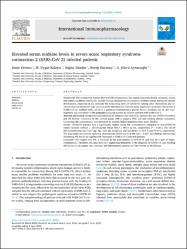Elevated serum midkine levels in severe acute respiratory syndrome coronavirus 2 (SARS-CoV-2) infected patients
Künye
Ketenci, S., Uygar Kalaycı, M., Dündar, B., Duranay, R., & Şükrü Aynacıoğlu, A. (12.08.2022). Elevated serum midkine levels in severe acute respiratory syndrome coronavirus 2 (SARS-CoV-2) infected patients. International Immunopharmacology. 110(108939). pp. 1-6. https://doi.org/10.1016/j.intimp.2022.108939 Özet
Background: The coronavirus disease-2019 (COVID-19) pandemic has caused important health, economic, social, and cultural problems worldwide. Recent findings demonstrate an excessive cytokine release during the disease development, especially in the seriously life-threatening form of COVID-19. Among other chemokines and cytokines that are released in high amounts at the infection site of severe acute respiratory syndrome coronavirus 2 (SARS-CoV-2), midkine (MK), which is a potent pro-inflammatory growth factor/ cytokine, can be also overexpressed and contribute to the pathophysiological process in patients infected with SARS-CoV-2.
Materials and method: Serum was collected from 87 intensive care unit (ICU) patients that are COVID-19 positive and 50 healthy volunteers in the control group with a negative PCR test and without disease symptoms. Circulating MK concentration was measured by enzyme-linked immunosorbent assay (ELISA).
Results: COVID-19 patients had a significantly higher serum MK concentration compared to non-COVID-19 control subjects (1892.8 +/- 1615.8 pg/mL versus 680.7 +/- 907.6 pg/mL, respectively; P < 0.001). The cut-off MK concentration was 716.7 pg/ mL, with the sensitivity and specificity of 75.9 % and 76.0 %, respectively. The area under the receiver operating characteristic (ROC) curve of MK was = 0.827. Our findings showed that circulating MK levels are significantly increased in SARS-CoV-2 infected patients.
Conclusion: We suggest that MK is involved in the pathogenesis of COVID-19 and may be a part of hypercytokinaemia. Therefore, MK may serve as a supporting biomarker in the diagnosis of COVID-19, and blocking MK actions or its targets may attenuate the inflammatory process and the severity of the disease.
Cilt
110Sayı
108939Bağlantı
http://www.journals.elsevier.com/international-immunopharmacology/https://hdl.handle.net/20.500.12900/88

















